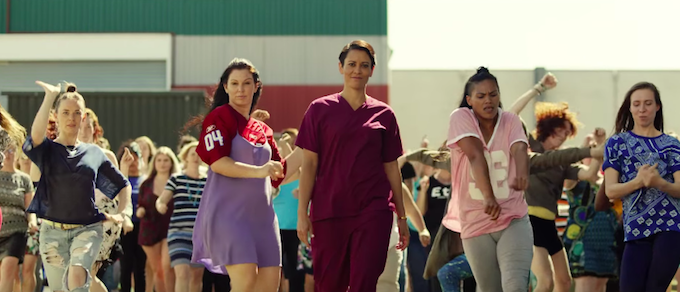Treat Her Right: Kiwi women get their groove on to fight for equal rights

The online video is a remake of the Donna Summer video and song ‘She Works Hard for the Money’ and features the familiar faces of comedians, personalities alongside members of the public demonstrating how far New Zealand has come over the years. It shows the move to ban smoking in public environments, make front and backseat seatbelts compulsory, ban burning household waste as well as make pay equal. However, while the first three acts have proved successful, the later remains to be seen, so the video argues: “It’s time to pay the sisters the same as the misters.”
On average, women are paid $7 an hour less than men for comparable work, according to the National Income Survey in 2016. Based on current figures, it will take 45 years to catch up and close the 13 percent gap.
And women are not happy about it, at least according to the 400-plus women who responded to the call to participate in the video’s dance scene. Shot just before Christmas, it saw women travel from Hamilton, Wellington and Whakatane to show their support for the cause.
They were joined by comedian Alice Brine and actors Jennifer Ward-Lealand, Miriama McDowell (Mahana, Dark Horse, Outrageous Fortune), Dave Fane (Gary of the Pacific, Bro’ Town, Sione’s Wedding), Laura Hill (Westfield, Shortland St), Luciane Buchanan (Filthy Rich), and Jackie Van Beek (Funny Girls).
Director Loren Taylor (Eagle vs Shark) was overwhelmed by the generosity and the willingness of people approached to bring their time, their resources and their energy to the project.
“For the big dance scene, we had embalmers dancing alongside teachers, bakers, construction workers, lawyers, mothers, artists, politicians. It was a real celebration and an opportunity for those with the time and resources to highlight an issue which affects all women, particularly those who are often struggling between two or three jobs so don’t have time or energy to fight for equal pay rates.”
Playing the ‘everywoman’—the cleaner, childcare worker and aged care worker—is McDowell, who says she felt honoured to take on the role.
“I felt like I’m playing every woman who has ever been underpaid. In every scene, I shot I thought of a different person who I know who isn’t valued for the work they do. My sister, my friends, my aunty, my nana, all of the people through the generations are who we’re doing this for.”
Brine also shared her thoughts on the issue, saying New Zealand used to be a progressive country in this area and it’s banking on that branding. But you can’t rely on Kate Sheppard forever, she warns, because the data is pretty shocking.
Remembered for fighting for equality, Sheppard has been used in a previous campaign fighting for equal pay by YWCA Auckland and DDB in 2014.
It saw an open letter published to the Reserve Bank governor Graeme Wheeler, calling for Sheppard’s image to be removed from the $10 note and replaced with that of a man. It was argued that Sheppard would not be pleased to have her face on the note at a time when for every $10 men earn, women only earn nine.
At the time, the co-president of YWCA, Sina Wendt-Moore, said the very fact that “progressive organisations” are taking steps to close the gender gap indicates that there are still ongoing problems. And it isn’t only the employers that are complicit in the perpetuation of this system.
“There is a genuine ignorance about the issue, and so subsequently has been very little action to dealing with it. There is unconscious gender bias built into workplaces – in the way they recruit, employ and performance manage people. Women themselves play a role because they are reluctant negotiators – lifelong socialisation can discourage women from ‘un-female’ behaviours, such as assertiveness, self-promotion and negotiation,” she said.




